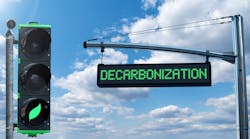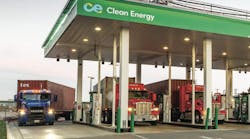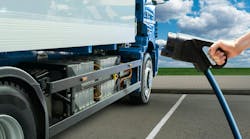Anyone who knows me knows that I am big on using the analogy of a three-legged stool to define issues. There is something about the balance of three that appeals to me. I have been thinking about three when it comes to the decarbonization of the trucking industry. And I think I have it figured out—or at least have one theory about it.
Three things necessary to decarbonize trucking
- Burn less fuel: I think we sometimes forget that burning less diesel fuel is a way of decarbonizing the transportation of goods. Less fuel used equals fewer emissions out of the truck’s tailpipe. As an industry, we need to continue to look at ways to make diesel-powered vehicles more fuel efficient because they are going to be around for quite some time, even as we move to other power sources for commercial vehicles. Fleets need to consider investing in things like aerodynamic devices for both tractors and trailers, idle reduction devices, low rolling resistance tires, and tire pressure monitoring systems. The list goes on. They also should look at things like downsped engines and 6x2 axle configurations. There are also operational practices like route optimization, reducing empty backhauls, setting engine parameters for fuel economy, and training drivers to operate vehicles in a fuel-efficient manner. All you need to do is talk to some of the drivers who participated in Run on Less 2017 to see just how much influence a driver has on fuel economy.
- Move to zero emissions: It is clear that we are heading to a zero-emissions future. Now is the time to begin to not only research, but also test some zero-emissions powertrains in your fleet. Sustainability is becoming a more critical factor in shippers’ decisions about which fleets they will do business with. Sustainability is not a fad; it is fast becoming a principle that is driving how businesses operate. Fleets need to begin their journey to zero-emission now, or they will find themselves playing catch up in a short period of time.
- Consider alternative fuels: While diesel is the predominant fuel in the trucking industry today, there are other options available that might make sense in some duty cycles. Look into alternatives like compressed natural gas and liquified natural gas, hybrids, battery-electric, and hydrogen fuel cells. Some of these technologies may have a place in your operation. Research these alternatives and talk to fleets that are having success with them. Remember, no one solution is right for every fleet or even for every duty cycle. It is likely that a poly-fuel option will be the choice of many fleets over the next decade.
The trucking industry is realizing the important role it plays in improving air quality and reducing carbon emissions. The good news is that there are at least three paths that will get us closer to zero.
Michael Roeth has worked in the commercial vehicle industry for nearly 30 years, most recently as executive director of the North American Council for Freight Efficiency (NACFE). He serves on the second National Academy of Sciences Committee on Technologies and Approaches for Reducing the Fuel Consumption of Medium and Heavy-Duty Vehicles and has held various positions in engineering, quality, sales, and plant management with Navistar and Behr/Cummins.



